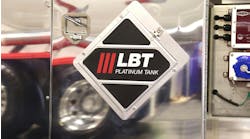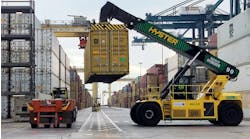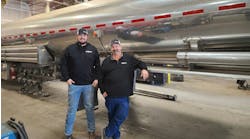At best, the tank trailer leasing market in the United States and Canada is flat right now, according to tank leasing executives who recently spoke with Bulk Transporter magazine. They add that they are seeing a gradual recovery that should continue into 2021.
Recent challenges for tank leasing operators have included the difficulties that came with government-mandated stay-at-home orders. In-person sales calls—an important part of the marketing effort by leasing representatives—haven’t been allowed. This has made it especially difficult to develop new business opportunities.
Some customers have requested discounted lease rates or delayed payments. Some equipment has been returned.
Annie Tremblay, Tremcar Inc executive vice-president and director of Tremlease Inc in Strasburg, Ohio, says that some of the key markets served by Tremlease shut down abruptly with the on-set of the coronavirus pandemic in Canada and the United States.
“We thought the oilfield was bad before the pandemic, but it was nearly dead with the shutdown,” she says. “Petroleum and crude oil hauling are still slow. Tank trailers in chemical hauling are doing OK for now, and sanitary food tanks are still busy. We’re starting to see more recovery in various markets, including crude oil.
“We definitely expect the market to continue improving through the rest of this year. It won’t be a busy year, but our lease fleet will do OK.”
That lease fleet includes about 350 tank trailers, including new and used. The oldest trailers in the fleet are about 15 years old. While some new trailers go into long-term leases, most of the Tremlease leased trailers are acquired used as trade-ins to Tremcar. Tank trailers are available through short- and long-term leases.
Market slowdown
Chris Kern, manager of the lease fleet at the Jack Olsta Co in Huntsville, Texas, suggests that not all of the blame for a slow tank leasing market can be heaped on the coronavirus pandemic. “A majority of our tank trailers are leased to customers hauling chemicals, and that sector of the economy had already begun to show sluggishness in November and December of 2019,” he says. “The pandemic shutdown certainly made things worse.”
Utilization of the lease fleet is down somewhat—some of their customers have suggested that they are down as much as 30% to 40%. “We have more tank trailers in inventory now than we expected to have at this point in the year,” Kern says.
What’s worse is it’s hard to do much to change the situation right now. “With travel restrictions, it’s been more difficult to get in front of most of our customers, and many of them are less willing to talk about new opportunities right now,” he says. “Projects and programs that they were working on are now on hold. They are waiting until a return to normal, whatever normal might be.”
The Jack Olsta Co serves a wide mix of customers—their leasing division has primarily focused on chemical shippers and haulers—in the eastern half of the United States. Twelve-month contracts are typical for many of the customers, while longer contracts typically receive lower monthly rates.
“Customers lease tank trailers when there is uncertainty in the marketplace,” Kern says. “Leasing also enables them to allocate capital investment to other areas. Leasing also enables fleets to newer tanks. Sometimes that’s for image, but it also helps lower maintenance costs.”
Diverse fleet
The Jack Olsta lease fleet includes DOT407 stainless steel chemical tanks, acid trailers, MC331 LP-gas trailers, and aluminum vacuum/pneumatic bulkers for plastics.
The leasing operation adds to the fleet annually, and the average age of the fleet is eight to 10 years. Built by Heil, Bulk, and Brenner, chemical trailers typically have a 7,000-gallon capacity. Recent purchases were constructed of 2205 duplex steel, which offers a dramatic improvement in resistance to pitting corrosion, according to Kern.
“We want to achieve a 25-year asset life,” Kern says. “We’re confident that the duplex steel will help us meet that objective.”
New tanks are spec’d with Betts hardware, including ground-level vapor recovery. Trailers also have air off-loading lines. Newer trailers are spec’d with fall protection. The fleet includes both spring and air suspensions. More customers are requesting air suspensions.
Oxygen tanks
Richard Smith, Kenan Advantage Group trailer leasing manager, oversees approximately 400 trailers in the company’s leasing fleet. He had rejoined the company on March 16 after a short absence and was immediately sent home to work due to the COVID-19 outbreak.
While much of KAG’s tank leasing activity slowed dramatically, cryogenic trailers used to transport liquefied oxygen proved to be an exception. “Those trailers were critical for shipments to hospitals,” Smith says.
KAG’s lease fleet can handle a diverse range of products, including refined fuels, chemicals, propane, cryogenic materials, food grade, and asphalt. The lease fleet draws most of its equipment from other KAG divisions.
Shippers account for a majority of the customers served by the lease fleet. Smith says leased trailers give shippers the ability to handle market fluctuations and to expand quickly into new markets.
Smith adds that a majority of customers are holding onto their leased trailers. “We expect the rest of this year will be slow, but we are optimistic about next year,” he says. “We believe the market will rebound in 2021. WE want our tank leasing operation to grow substantially.”
Fairly steady
Jim Rogers, vice president of sales for Matlack Leasing LLC, Bala Cynwyd, Pennsylvania, says business has actually remained fairly steady, with the exception of the oilfield. The company is finding new business and is leasing two to three trailers a week.
To meet customer needs, Matlack Leasing has purchased 700 to 800 new tank trailers over the past eight years. The average age of the fleet is about seven years old.
Most of the tank trailers are DOT407 stainless steel with a 7,000-gallon capacity and were built by Polar, Brenner, and Bulk. The fleet also includes some MC331 pressure vessels. New chemical trailers are specified with liquid level gauges and ground-level vapor recovery.
While customers are spread across the eastern half of the United States, about half of Matlack Leasing’s business is in Louisiana and Texas.
“We’re keeping busy,” Rogers says. “Projects we started working on in 2019 were still underway. However, activity slowed significantly over the past 60 to 90 days. Tank truck carrier loads flattened, and flat probably will be our normal for the rest of the year.
“We don’t know what longterm impact the coronavirus pandemic will have on our business. We need to see our customers and our equipment in the field. That’s not possible right now. Most of our customers are working from home. We use Zoom and Skype internet applications, but it’s still tough to reach people. We want to be optimistic. With a vaccine, we believe the economy could get back to the 2019 level in 2021.”
Recovery signs
Ralph Nappi, vice-president of operations at Transport Resources Inc in Matawan, New Jersey, says he can see certain signs of a recovery. “All things, considered, we’re not in bad shape,” he says. “Energy is down, but we have a diverse customer base. Other sectors are improving.”
Some leased tank trailers are idle and some has been returned. However, many customers anticipate a bounce in the economy and they held onto their leased tank trailers. “We’re starting to see more interest in new tank trailer leases,” Nappi says.
“Hopefully, the real recovery will begin next year,” he adds. “2020 will just be a lost year.”
Some customers lease tank trailers for the flexibility they gain in reacting quickly to changes in the economy. “Leasing creates opportunities for them, Nappi says. “We help them in developing new business without the risk that goes with buying new equipment.”
“Some customers see leasing as a way to replace tank trailers regularly to keep the look of a new fleet. “We offer them three- to four-year leases,” he says. “It’s kind of like leasing a car. It also helps keep maintenance costs in check.”
Over the past several years, Transport Resources has added new equipment to help bring down the age of the trailer fleet. The DOT407 stainless steel tank trailer dominates the fleet with capacities ranging from 5,500 to 7,000 gallons.
Primarily built by Tremcar, the newer chemical trailers have a temperature rating of 400 F. Transport Resources has purchased a number of lean duplex tanks, with mixed success. Nappi cautions that even duplex steel is susceptible to corrosion under certain circumstances.
New tank specifications include ground-level vapor recovery, fall protection, side and rear product unloading, air-ride suspensions, and aluminum disc wheels.
Nappi says his chief objective in coming months is to make sure the tank trailers in the Transport Resources fleet are leased and on the road.








